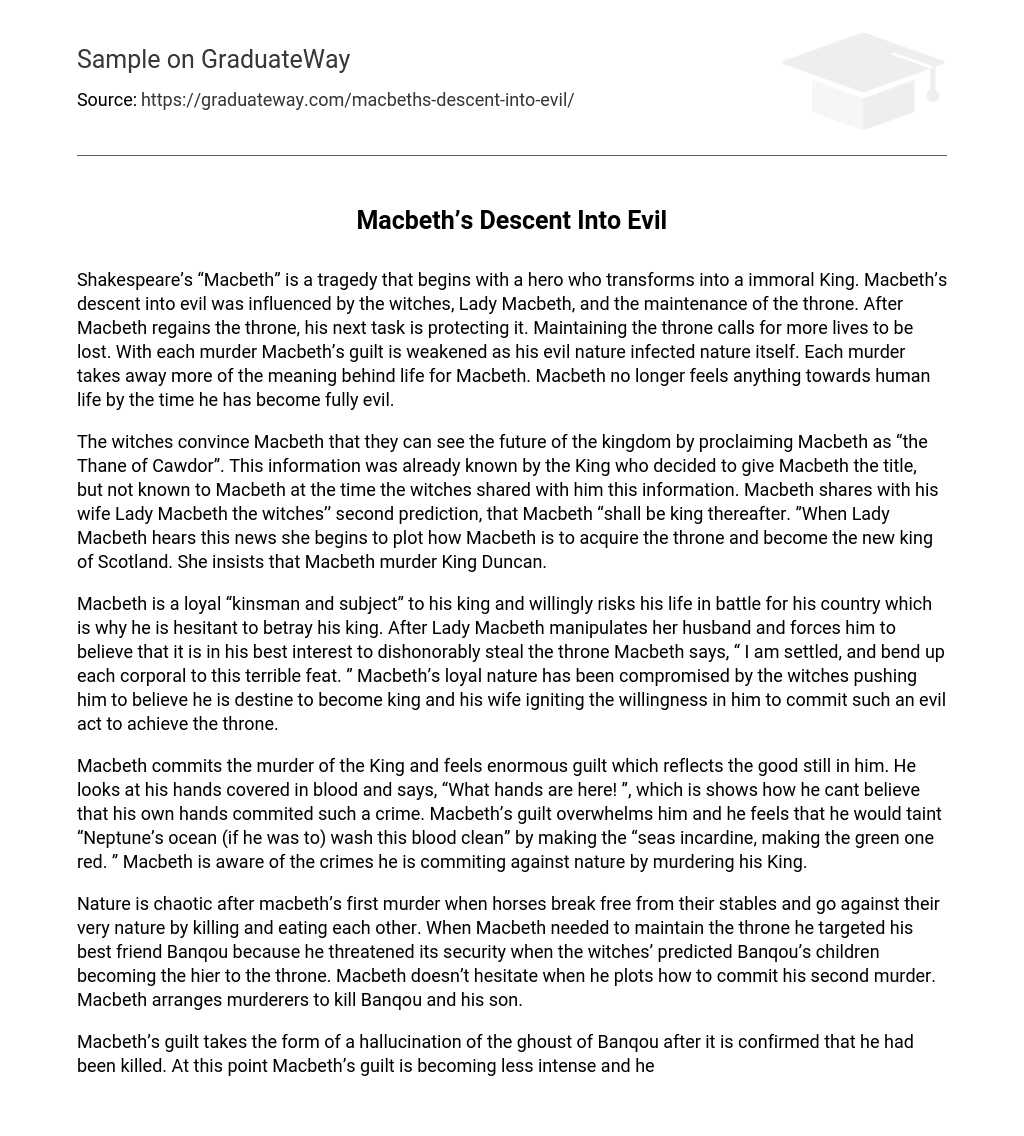The play “Macbeth” by Shakespeare presents the tragic tale of a protagonist who experiences a profound change, transforming into an amoral King. Macbeth’s decline into wickedness is influenced by several factors such as the witches, Lady Macbeth, and his ambition to maintain his reign. After reclaiming power, Macbeth must safeguard it at all costs, resulting in further bloodshed. Each murder erodes Macbeth’s remorse and taints nature with his malevolence. As he persists in killing, the value of human life diminishes for Macbeth until he ultimately becomes entirely evil.
The witches inform Macbeth of their ability to foresee the future of the kingdom by declaring him as “the Thane of Cawdor”. Although King Duncan already knew this and had decided to grant Macbeth that title, Macbeth himself was unaware until the witches told him. Macbeth shares both pieces of information with his wife, Lady Macbeth. Additionally, he informs her about the witches’ second prophecy that he “shall be king thereafter”. Upon hearing this, Lady Macbeth immediately starts planning how they can seize the throne and make Macbeth the new ruler of Scotland. She insists that they must murder King Duncan.
Initially, Macbeth is portrayed as a devoted “kinsman and subject” to his king. He willingly puts himself at risk in battle for the benefit of his country, causing him to hesitate when it comes to betraying his monarch. However, Lady Macbeth manipulates her spouse and convinces him that seizing the throne dishonorably is in his best interest. Under her sway, Macbeth declares, “I am settled, and bend up each corporal to this terrible feat.” Consequently, Macbeth’s loyal nature becomes compromised due to the influence of the witches, leading him to believe that he is fated to be king. Furthermore, Lady Macbeth further encourages his eagerness to commit such a wicked deed in order to obtain the throne.
Macbeth commits the murder of the King and experiences intense guilt, which signifies the remnants of goodness within him. He gazes at his blood-stained hands, exclaiming, “What hands are here!”, demonstrating his disbelief in the realization that he himself has committed such a heinous act. The enormity of Macbeth’s guilt overwhelms him, to the extent that he believes attempting to cleanse himself by washing away the blood would contaminate even the vastness of Neptune’s ocean, turning the seas crimson and staining the green with red. Macbeth acknowledges the violations he is committing against nature through the act of regicide.
After Macbeth commits his first murder, chaos ensues in nature as horses break free from their stables and defy their natural instincts by attacking and devouring each other. In order to safeguard his position on the throne, Macbeth considers his best friend Banqou a threat due to the witches’ prophecy that Banqou’s offspring would inherit the throne. Without hesitation, Macbeth devises a plan to carry out his second murder by hiring assassins to kill both Banqou and his son.
Macbeth experiences guilt in the form of a hallucination of Banqou’s ghost after learning of his death. As his guilt diminishes, Macbeth becomes more ruthless in protecting the throne. Out of anger towards Macduff, Macbeth orders the murderers to kill his wife and child. The witches predict Macbeth’s downfall by informing him that Macduff is the only remaining threat. Overconfident and fueled by anger, Macbeth eagerly acts upon these revelations.
Macbeth’s relentless pursuit of the throne has turned him into a heartless and remorseless individual. He shows no guilt or humanity as he ruthlessly kills innocent people, even when they pose no threat to him. This transformation is a result of his desensitization to death. Lady Macbeth, on the other hand, is tormented by her involvement in the initial murder and eventually succumbs to her own inner demons. She realizes that her manipulative actions have set off a chain reaction that leads to the loss of Macduff’s family. The overwhelming desire for power completely changes Macbeth’s character, causing him to disregard the worth of human life.
Macbeth shows indifference when he learns of his wife’s death, remarking, “Out, out brief candle,” as if her death was inconsequential. He views life as a meaningless performance, comparing it to “a poor player that struts and frets his hour upon the stage…signifying nothing.” Macbeth believes that life is predetermined and that one’s actions and words cannot alter their destiny; ultimately, humans exist only to die. Therefore, Macbeth concludes that human life lacks purpose, which further emphasizes his descent into evil.
Macbeth started off as a faithful kinsman and subject. However, the influence of the manipulative witches and Lady Macbeth’s plot to gain power made it clear that Macbeth was destined for failure from the beginning. The throne, acquired through deceit, required constant protection. With each murder, Macbeth’s character deteriorated and nature itself turned into darkness. Ultimately, his disregard for life and inability to find meaning in it sealed his fate as he descended into wickedness.





